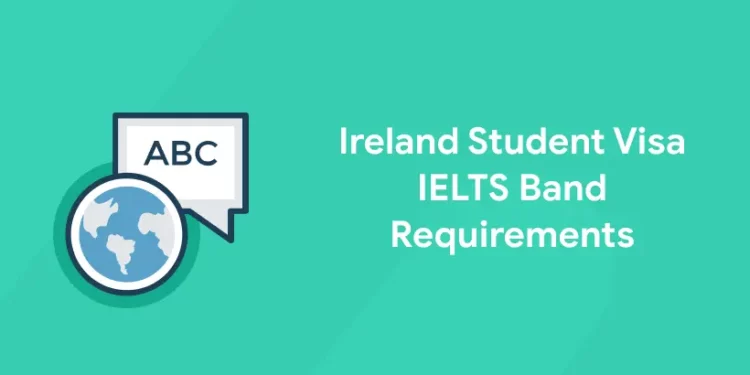Table of Contents
If you want to study, work, or immigrate to Ireland, you may need to take an International English Language Testing System (IELTS) exam. Your chances of being accepted are significantly impacted by your IELTS score, which is an important consideration for Ireland. Your chances of succeeding in your objectives in Ireland might be improved by being aware of the IELTS requirements and learning how to raise your score.
This guide will give you useful details regarding the IELTS score needed for Ireland, including the requirements for various purposes and advice on how to raise your score.
IELTS score requirements for Ireland
ELTS score requirements, which can change according on your desired programme, institution, and level of study. Here are the precise IELTS requirements for enrolling in college in Ireland:
Undergraduate Programs
The majority of Irish universities and colleges often require an overall IELTS score of 6.0 to 6.5, with no individual band score falling below 5.5 or 6.0, if you are applying for an undergraduate programme, such as a Bachelor’s degree. The particular requirements, however, could change based on the institution and programme. In the case of some competitive programmes, a higher total score, such as 6.5 to 7.0, may be required, particularly in the disciplines of medicine, pharmacy, dentistry, and other health-related fields.
Postgraduate Programs
IELTS score requirements for postgraduate programmes, such a Master’s or PhD, are typically higher in Ireland than for undergraduate programmes. Depending on the institution and programme, most universities and colleges require an overall IELTS score of 6.5 to 7.0, with no individual band score lower than 6.0 or 6.5. However, some selective programmes, especially those in the business, engineering, and legal disciplines, may have a higher cutoff score requirement, such as 7.0 to 7.5.
English Language Preparatory Programs
The IELTS score requirements may be lower than those for undergraduate or postgraduate programmes if you intend to enrol in an English language preparatory programme, such as an English language course or a foundation programme, to advance your language abilities before beginning your academic studies in Ireland. For English language preparatory programmes, a general score of 5.0 to 6.0 may be sufficient, but it is best to check with the particular institution for their criteria.
IELTS score requirements for Ireland for work
1: Most university students ........................ on campus in their first year.
Depending on the type of visa or work permit you are applying for as well as the particular position or industry you are seeking employment in, there are different IELTS score requirements for employment in Ireland. When compared to jobs that don’t require as much interaction with English-speaking people, like manual labour or back-end administrative positions, roles that involve direct communication with customers or clients, like customer service, sales, or hospitality, may generally require a higher level of English language proficiency.
A minimum IELTS score of 6.0 or higher may be needed for each of the four test sections—Listening, Reading, Writing, and Speaking—for the majority of work visa categories in Ireland. But in some circumstances, a higher IELTS score of 7.0 or higher may be needed for certain work visas, such as the Critical Skills Employment Permit or the General Employment Permit, especially if the position calls for a high level of English language proficiency or if the employer has set higher language requirements.
IELTS Score Requirement for Top Universities in Ireland
Depending on the institution, programme, and level of study, different top universities in Ireland may have different IELTS score requirements. For undergraduate programmes, most Irish universities generally require an overall IELTS score of 6.0 to 6.5, and for postgraduate programmes, 6.5 to 7.0.
| University | IELTS Minimum Requirement (Undergraduate) | IELTS Minimum Requirement (Postgraduate) |
|---|---|---|
| Trinity College Dublin | 6.5 | 6.5 |
| University College Dublin | 6.5 | 6.5 |
| University College Cork | 6.5 | 6.5 |
| National University of Ireland, Galway | 6.5 | 6.5 |
| University of Limerick | 6.5 | 6.5 |
| Dublin City University | 6.5 | 6.5 |
| Maynooth University | 6 | 6.5 |
Times Higher Education World University Rankings 2023
| University | Times Higher Education Ranking (2020) | IELTS Minimum Requirement (Undergraduate) | IELTS Minimum Requirement (Postgraduate) |
|---|---|---|---|
| Trinity College Dublin | 161 | 6.5 | 6.5 |
| University College Dublin | 201-250 | 6.5 | 6.5 |
| University College Cork | 301-350 | 6.5 | 6.5 |
| National University of Ireland, Galway | 301-350 | 6.5 | 6.5 |
| University of Limerick | 601-800 | 6.5 | 6.5 |
| Dublin City University | 401-500 | 6.5 | 6.5 |
| Maynooth University | 401-500 | 6 | 6.5 |
QS World University Rankings 2023
| University | Times Higher Education Ranking (2020) | IELTS Minimum Requirement (Undergraduate) | IELTS Minimum Requirement (Postgraduate) |
|---|---|---|---|
| Trinity College Dublin | 98 | 6.5 | 6.5 |
| University College Dublin | 181 | 6.5 | 6.5 |
| University College Cork | 303 | 6.5 | 6.5 |
| National University of Ireland, Galway | 270 | 6.5 | 6.5 |
| University of Limerick | 531-540 | 6.5 | 6.5 |
| Dublin City University | 471 | 6.5 | 6.5 |
| Maynooth University | 801-1000 | 6 | 6.5 |
IELTS score requirements for Ireland for study for work for immigration
You can be asked to provide proof of your English language ability as part of your immigration application by the Irish Naturalisation and Immigration Service (INIS), which is in charge of immigration proceedings in Ireland. The IELTS score requirements for immigration to Ireland are typically higher than those for study programmes since immigration frequently calls for a greater level of English language proficiency.
The following IELTS score criteria are in effect as of April 2023 for immigration to Ireland:
General Skills Employment Permit
You must have an overall IELTS band score of 6.0 or above, with no individual band score lower than 5.0, in order to be considered for a General Skills Employment Permit, a form of work permit for highly trained workers.
Critical Skills Employment Permit
You must have an overall IELTS band score of 6.5 or above, with no individual band score lower than 6.0, in order to be considered for a Critical Skills Employment Permit, a form of work permit for professions with high demand.
Dependent/Partner/Spouse/Immigrant Investor
You typically need to have a lesser level of English language ability if you’re applying for a visa as a dependant, partner, spouse, or immigrant investor. For these visa categories, the current IELTS score requirements may range from an overall band score of 4.0 to 5.0, with no individual band score being less than 4.0.
Tips to increase your chances of acquiring an excellent IELTS score
A deliberate and committed approach to language preparation is necessary to increase your chances of receiving a good IELTS score. Here are some suggestions to increase your likelihood of receiving a good IELTS score:
Familiarise yourself with the IELTS format
It’s important to comprehend the IELTS test’s format. The four sections of the IELTS exam are Speaking, Reading, Writing, and Listening. Learn about the format, timing, and questions that will be asked in each part. To obtain a feel for the test format and create efficient test-taking techniques, practise with real IELTS sample tests.
Enhance your English language skills
To get a high IELTS score, you must improve your English language abilities. Improve your grammar, reading, writing, speaking, and listening skills. To enhance your language skills, read widely on a variety of subjects, practise writing essays, have conversations in English, and watch or listen to English audio or video.
Practise regularly with timed mock tests
The secret to raising your IELTS score is consistent practise. To imitate the actual test environment and gauge your performance, take timed practise exams. To determine your strengths and shortcomings, go over your responses and take note of your errors. Concentrate on your areas for improvement and adjust your practise accordingly.
Develop effective time management skills
The IELTS test requires excellent time management. During practise exams, work on time management skills to make sure you can finish all portions within the allotted time. To make sure you complete all the activities completely, learn how to skim and scan properly in the reading phase and how to successfully manage your time in the writing and speaking areas.
Learn and practise test-taking strategies
Learn the best test-taking techniques that will help you achieve your highest possible score. For instance, in the Listening portion, pay attention to listening for keywords, make notes, and steer clear of challenging questions. Practise scanning and skimming methods in the Reading portion, and thoroughly read the questions before attempting to respond. Make sure your essays are well-structured in the writing portion, and utilise pertinent examples and facts to back up your claims. Organise your responses rationally and talk clearly and with confidence in the Speaking part.
Seek feedback and guidance
To recognise areas that require work, get opinions from an experienced English language teacher or a native English speaker. To obtain additional direction and assistance, make use of online resources, study materials, and IELTS preparation books and courses. To develop your speaking abilities and get feedback on your performance, practise speaking English with a language partner or an instructor.
Conclusion
It is necessary to obtain the necessary IELTS score in order to study, work, or immigrate to Ireland. To increase your chances of success, it is crucial to carefully grasp the unique requirements of the institution, organisation, or visa category you are applying for.
Ireland Student Visa IELTS: FAQs
Q1. What is the minimum IELTS score required to study in Ireland?
Ans: Depending on the institution and programme, a different IELTS minimum score may be needed to enrol in a course in Ireland. However, the majority of Irish universities and colleges typically demand an IELTS Academic module total band score of 6.0 to 6.5. Higher standards, ranging from 6.5 to 7.0 or even higher, may apply to some competitive programmes or institutions.
Q2. Does Ireland require IELTS?
Ans: IELTS is typically accepted as evidence of English language competency for non-native English speakers for a variety of purposes in Ireland, including education and immigration. Depending on the specific objective, such as university admissions or visa applications, the required IELTS score may change.
Q3. What are the requirements for admission to Irish universities?
Ans: Depending on the institution, the level of study, and the programme you are applying for, different universities in Ireland may have different minimum score requirements. Most universities and colleges typically demand an overall IELTS score of 6.0 to 6.5 for applicants to undergraduate programmes, with no individual band score falling below 5.5 or 6.0.
Q4. How can I strengthen my IELTS rating?
Ans: By regularly practising your English language abilities, you can raise your IELTS score. Improve your reading, writing, listening, and speaking abilities by speaking English with native speakers, reading English books and newspapers, writing essays and reports, listening to English podcasts, and practising with sample exam materials.










